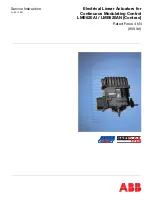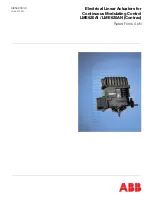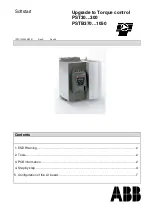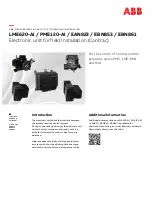
,QVWDOOLQJ DQG 2SHUDWLQJ ,QVWUXFWLRQV
UHO FRG
UHO FRG
1592009037 XW270-271L GB r1.0 15.12.2004.doc
;:/ ;:/
3/4
OP : the digital input is activated by opening the contact.
I2P
Configurable digital input polarity:
CL : the digital input is activated by closing the contact;
OP : the digital input is activated by opening the contact
I2F
Digital input operating mode: configure the digital input function:
EAL = generic alarm;
bAL = serious alarm mode;
PAL = Pressure switch;
dFr = Start defrost;
AUS = Relay AUX actuation;
Es = Energy Saving;
onF = remote On/OFF.
did Time interval/delay for digital input alarm:(0
÷
255 min.) Time interval to calculate the number of the
pressure switch activation when I2F=PAL. If I2F=EAL or bAL (external alarms), “did” parameter defines the
time delay between the detection and the successive signalling of the alarm.
SAA Set Point for anti-condensing heater: (-50,0÷110,0°C; -58÷230°F) defines the room temperature
setpoint to switch on the anti-condensing heater.
OTHER
Adr RS485 serial address (1÷247): Identifies the instrument address when connected to a ModBUS
compatible monitoring system.
Rel Release
software: (read only) Software version of the microprocessor.
Ptb Parameter
table: (read only) it shows the original code of the
parameter map.
Prd Probes display: (read only) display the temperature values of the evaporator probe Pb2 and the auxiliary
probe Pb3.
Pr2 Access to the protected parameter list (read only).
DIGITAL INPUTS
The Wing series can support up to 2 free contact digital inputs. One is always configured as door switch, the
second is programmable in seven different configurations by the “I2F” parameter.
DOOR SWITCH INPUT
It signals the door status and the corresponding relay output status through the “odc” parameter:
no = normal (any change);
Fan = Fan OFF;
CPr = Compressor OFF;
F_C = Compressor and fan OFF.
Since the door is opened, after the delay time set through parameter “dOA”, the alarm output is enabled and the
display shows the message “dA”. The alarm stops as soon as the external digital input is disabled again. During
this time and then for the delay “dot” after closing the door, the high and low temperature alarms are disabled.
CONFIGURABLE INPUT - GENERIC ALARM (EAL)
As soon as the digital input is activated the unit will wait for “did” time delay before signalling the “EAL” alarm
message. The outputs status don’t change. The alarm stops just after the digital input is de-activated.
CONFIGURABLE INPUT - SERIOUS ALARM MODE (BAL)
When the digital input is activated, the unit will wait for “did” delay before signalling the “BAL” alarm message.
The relay outputs are switched OFF. The alarm will stop as soon as the digital input is de-activated.
CONFIGURABLE INPUT - PRESSURE SWITCH (PAL)
If during the interval time set by “did” parameter, the pressure switch has reached the number of activation of the
“nPS” parameter, the “PAL” pressure alarm message will be displayed. The compressor and the regulation are
stopped. When the digital input is ON the compressor is always OFF.
CONFIGURABLE INPUT - START DEFROST (DFR)
It executes a defrost if there are the right conditions. After the defrost is finished, the normal regulation will restart
only if the digital input is disabled otherwise the instrument will wait until the “Mdf” safety time is expired.
CONFIGURABLE INPUT - RELAY AUX ACTUATION (AUS)
This function allows to turn ON and OFF the auxiliary relay by using the digital input as external switch.
CONFIGURABLE INPUT - ENERGY SAVING (ES)
The Energy Saving function allows to change the set point value as the result of the SET+ HES (parameter) sum.
This function is enabled until the digital input is activated.
CONFIGURABLE INPUT - REMOTE ON/OFF (ONF)
This function allows to switch ON and OFF the instrument.
DIGITAL INPUTS POLARITY
The digital inputs polarity depends on “I1P” and “I2P” parameters.
CL : the digital input is activated by closing the contact.
OP : the digital input is activated by opening the contact
INSTALLATION AND MOUNTING
Instruments XW270L, XW271L shall be mounted on vertical panel, in a 150x31 mm hole, and fixed using two
screws
∅
3 x 2mm. To obtain an IP65 protection grade use the front panel rubber gasket (mod. RG-L). The
temperature range allowed for correct operation is 0 - 60 °C. Avoid places subject to strong vibrations, corrosive
gases, excessive dirt or humidity. The same recommendations apply to probes. Let the air circulate by the cooling
holes.
CUT OUT
165
150
31
+0.5
-0
+
0
.5
-0
+1
-1
Ø3 x2
XW270L/XW271L MOUNTING
1
1
2
2
3
3
4
4
R G -L X g a s ck e
(o p tio n al)
ELECTRICAL CONNECTIONS
The instruments are provided with screw terminal block to connect cables with a cross section up to 2,5 mm
2
for
the digital and analogue inputs. Relays and power supply have a Faston connection (6,3mm). Heat-resistant
cables have to be used. Before connecting cables make sure the power supply complies with the instrument’s
requirements. Separate the probe cables from the power supply cables, from the outputs and the power
connections. Do not exceed the maximum current allowed on each relay, in case of heavier loads use a suitable
external relay.
N.B. Maximum current allowed for all the loads is 20A.
PROBE CONNECTIONS
The probes shall be mounted with the bulb upwards to prevent damages due to casual liquid infiltration. It is
recommended to place the thermostat probe away from air streams to correctly measure the average room
temperature. Place the defrost termination probe among the evaporator fins in the coldest place, where most ice is
formed, far from heaters or from the warmest place during defrost, to prevent premature defrost termination.
TTL SERIAL LINE
The TTL connector allows, by means of the external module TTL/RS485, to connect the unit to a network line
ModBUS-RTU compatible as the
monitoring system XJ500 (Version 3.0).
The same TTL connector is used to upload and download the parameter list of the “HOT KEY“.
USE OF THE PROGRAMMING “HOT KEY “
The Wing units can UPLOAD or DOWNLOAD the parameter list from its own E2 internal memory to the “Hot
Key” and vice-versa.
DOWNLOAD (FROM THE “HOT KEY” TO THE INSTRUMENT)
1.
Turn OFF the instrument by means of the ON/OFF key, remove the TTL serial cable if present, insert the
“Hot Key” and then turn the Wing ON.
2.
Automatically the parameter list of the “Hot Key” is downloaded into the Wing memory, the “DoL”
message is blinking. After 10 seconds the instrument will restart working with the new parameters.
3.
Turn OFF the instrument remove the “Hot Key”, plug in the TTL serial cable, then turn it ON again.
At the end of the data transfer phase the instrument displays the following messages:
“end “ for right programming. The instrument starts regularly with the new programming.
“err” for failed programming. In this case turn the unit off and then on if you want to restart the download again or
remove the “Hot key” to abort the operation.
UPLOAD (FROM THE INSTRUMENT TO THE “HOT KEY”)
1.
Turn OFF the instrument by means of the ON/OFF key and remove the TTL serial cable if present; then
turn it ON again.
2.
When the Wing unit is ON, insert the “Hot key” and push
9
key; the "uPL" message appears.
3.
Push “SET” key to start the UPLOAD; the “uPL” message is blinking.
4.
Turn OFF the instrument remove the “Hot Key”, plug in the TTL serial cable, then turn it ON again.
At the end of the data transfer phase the instrument displays the following messages:
“end “ for right programming.
“err” for failed programming. In this case push “SET” key if you want to restart the programming again or remove
the not programmed “Hot key”.
ALARM SIGNALS
Message Cause
Outputs
“P1”
Thermostat probe failure
Alarm output ON; Compressor output according to
parameters “COn” and “COF”
“P2”
Evaporator probe failure
Alarm output ON; Other outputs unchanged






















